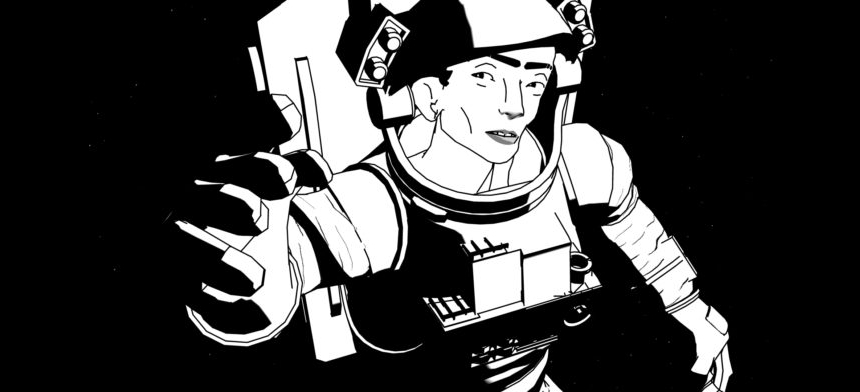ŻubrOFFka 2016 Review: BLACK, Award-winning Japanese Animation From Poland
Tomasz Popakul's BLACK, a Polish-Japanese animated short, is remarkably spellbinding.

There is something remarkably spellbinding about Tomasz Popakul's Polish-Japanese co-production Black, which won the award for Best Animation at this year's ŻubrOFFka Film Festival. It's unmistakably Japanese in style, and clearly a really passionate homage to the manga art so many of us grew up with. It's also deeply stark and dystopian, but undeniably enchanting.
The images that emerge out of the darkness of Black are intensely chiaro-scuro. They divide their fictional world into two extremes: pure, bright white and deep, jet black. There is a sort of clinical nature to Popakul's drawings too, with symmetry and straight lines boldly dividing up the screen before you. There's equally an element of chaos, though, as we find ourselves on a Japanese space station that has clearly seen better days - tubes and stray bits of wiring twist their way across the screen here and there.
It's a visual style that really pleases on a large screen and gives you a real sense of otherworldliness or the extremes of outer space. On top of that is stitched a brilliant sound design that is always filled with the sound of claustrophobic buzzing on the space station or the astronauts' laboured breathing. As a combination of visuals and sounds, this creates an experience which is delightfully repulsive, like one of those gothic novels you can't put down.
Your skin ever so slightly crawls as the film's gaunt, skeleton-like characters (a male and a female cosmonaut) jerkily float into view. Their faces seem exaggerated and emaciated, their movements like those of automata - and amazingly for an independent animation, it does almost look as thought they are floating in zero gravity. The secret seems to lie in the erratic, jerky speeds with which this animation moves back and forth, and the carefully observed sense of dimension with which it is drawn.
Also unnerving are the lizards and ants that hover in front of our vision. The ants, in particular, feel like a surrealist reference, used as they were by Dali to symbolise human civilization. And just like the ants that float about, humanity seems very much to have been cast adrift in Black by some kind of on-going nuclear holocaust. What remains expertly unclear is whether this was the reason our duo were sent into space, or whether they just happened to have front row seats to the end of the world.
The male astronaut even embarks on lengthy space walks where he does little more than motionlessly observe the nuclear plumes errupting across the globe. Clearly these waking nightmares have been bearing a heavy toll on his mental wellbieng too, as he seems to have fallen into a kind of lethargic despondence. As with the film's monochrome colour-schemes, though, Black is a film of contrasts, and the female astronaut seems painfully still hopeful and excitedly connected to life with her male counterpart.
Continuing these daily patterns, with no clear correspondence from earth except the presence or absence of nuclear explosions, the couple begin to go mad. Spells of meaningless are punctuated by moments of almost ferral violence and love making. And in the style of any good Japanese fiction, the creul reality of these moments even becomes funny - like when the male astronaut slowly begins to overflow the space station with little floating oragami paper cranes.
There is a maddening, topsy-turvy quality to this film that I find irresistable, and the insanely intricate detail of the animations definiely deserve awards. I urge fans of Japanese anime to lobby for chances to see it in their area.







